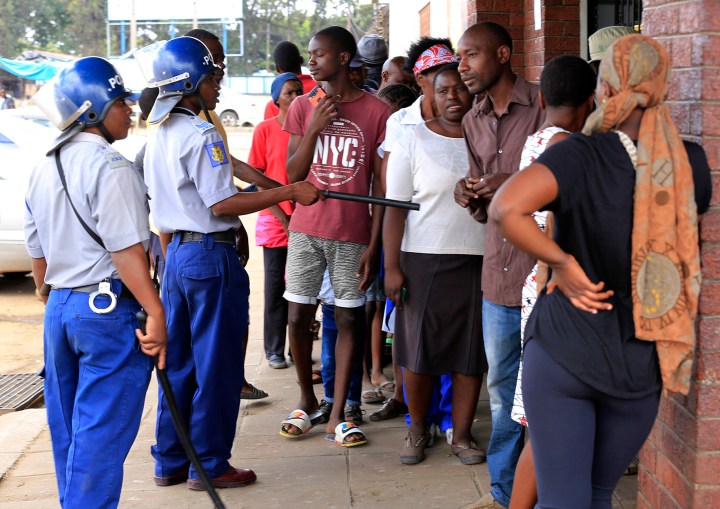Op-Ed
How to ensure accountable Covid-19 relief in debt-burdened countries

In a time of simmering public frustration over stark public inequities and governments’ failure to address them, smart, transparent spending will help bolster public trust.
The developing world and particularly the Global South are facing severe economic and humanitarian crises as a result of the Covid-19 pandemic. Our largely informal economies are being devastated.
The International Monetary Fund (IMF) now predicts that 170 countries will see negative per capita growth this year. Revenue collection is down everywhere, essential services are likely to be underfunded, and Covid-19 has been overlaid on top of existing struggles against malaria, TB, HIV/Aids and corruption. As usual, it is the poorest and the most vulnerable that are hurting the most.
We must act quickly and urgently. But our correct zeal to respond should not blind us to the hard lessons of what makes development effective and how resources should be put to good use.
Yes, we need significant financial resources but we need to use them well. This will require getting two things right:
First, the world’s poorest countries are haemorrhaging billions of dollars every year in servicing and repaying debts. Every dollar repaid is a dollar less to help the most vulnerable. Tanzania has an external debt of $23-billion, 65% of which comes from international financial corporations and donor countries. If our debt servicing is cancelled for one year, Tanzania will save up to $1.3-billion which can be used to immediately strengthen our health system and alleviate economic shocks. By my calculation, this could effectively increase Tanzania’s health budget by 150%. The situation is similar in dozens of African nations.
The recent G20 decision to suspend bilateral debt payments for 2020 to low-income countries that request the relief is therefore welcome. Although full cancellation would have been better than kicking the can down the road, this suspension will bring about an estimated $12-billion to $20-billion in relief. Larger amounts though are owed to international financial institutions. Following the spirit and intent of Ethiopian President Abiy Ahmed and other African and European leader’s calls for more concerted action, the World Bank and other institutions should cancel debt payments for at least the next two years.
Second, money saved from suspension and/or cancellation must be spent in ways that make a real difference. We have repeatedly learnt that authoritarian regimes cannot be trusted to use funds as they are intended. This is especially the case in times of emergency, where checks and balances can be put aside in the name of expediency. This problem is especially acute where authoritarian leaders dismiss expertise and threaten reprisals to those who question or oppose.
Therefore, we need to create conditions that will compel leaders to spend resources well. The best way to do this is to ensure full transparency, and enable citizens, experts, parliaments, and civil society to play a meaningful part in decision-making and oversight.
An approach similar to that followed with Highly Indebted Poor Countries (HIPC) should be followed. Each country that benefits from debt relief should be required to develop a coherent, measurable plan to strengthen their health system and provide stimulus to their economy.
Here are some tried and tested ways to do this:
- Transparency of Budgets and Expenditures: Money spent should be visible at all levels of service delivery.
- Transparency and Accountability in Public Procurement: Publish all public contracts online; use open and competitive bidding, and publish names of true owners (beneficial ownership) of companies awarded contracts.
- Independent Auditing: Governments ensure that all debt relief and relief funds are subject to independent auditing.
- Ensuring the ability of media to cover government initiatives freely without reprisal, threats, suspensions, or imprisonment.
- Allowing civil society to function freely, including the ability to foster debates, question government and publish critical thought.
“Spend as much as you can, but keep the receipts. We don’t want accountability and transparency to take a back seat in this crisis.” IMF boss Kristalina Georgieva couldn’t have put it better.
The suspension and/or cancellation of debt relief is a great opportunity for governments. Spending the money by following a standard framework of transparency and accountability will reduce corruption and wastage, and help the funds meet their objective to reduce human suffering.
In a time of simmering public frustration over stark public inequities and governments’ failure to address them, smart, transparent spending will help bolster public trust. Furthermore, it will strengthen the case for foreign aid and global solidarity post the pandemic. DM
Zitto Kabwe is an economist, Member of Parliament, and leader of the ACT Wazalendo Party in Tanzania.
"Information pertaining to Covid-19, vaccines, how to control the spread of the virus and potential treatments is ever-changing. Under the South African Disaster Management Act Regulation 11(5)(c) it is prohibited to publish information through any medium with the intention to deceive people on government measures to address COVID-19. We are therefore disabling the comment section on this article in order to protect both the commenting member and ourselves from potential liability. Should you have additional information that you think we should know, please email [email protected]"

















 Become an Insider
Become an Insider